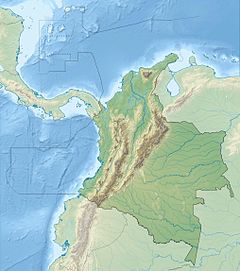The Tunjuelo or Tunjuelito River is a river on the Bogotá savanna and a left tributary of the Bogotá River. The river, with a length of 73 kilometres (45 mi) originates in the Sumapaz Páramo and flows northward through the Usme Synclinal to enter the Colombian capital Bogotá. There, the river is mostly canalised flowing westward into the Bogotá River. It is one of the three main rivers of the city, together with the Fucha and Juan Amarillo Rivers.
| Tunjuelo River Tunjuelito River | |
|---|---|
 | |
| Etymology | Muysccubun: "cerro de los tunjos" |
| Native name | |
| Location | |
| Country | Colombia |
| Department | Cundinamarca |
| Municipalities | Bogotá |
| Localities | |
| Physical characteristics | |
| Source | Sumapaz Páramo |
| • coordinates | 4°18′25″N 74°07′50″W / 4.3070°N 74.1306°W |
| Mouth | Bogotá River |
• coordinates | 4°37′45″N 74°13′21″W / 4.6291°N 74.2225°W |
| Length | 73 km (45 mi) |
| Basin features | |
| River system | Bogotá River Magdalena Basin Caribbean Sea |
Etymology
editThe names Tunjuelo and Tunjuelito ("little Tunjuelo") are derived from the Cerro de los Tunjos, also Los Tunjos Lake, named after the tunjos, the religious votive figurines of the indigenous language of the Muisca, who inhabited the Bogotá savanna before the Spanish conquest.[1]
Description
editThe Tunjuelo River has a total length of 73 kilometres (45 mi) and originates in the Sumapaz Páramo, in the southern part of Bogotá.[2] It flows through the southern part of the Colombian capital, south of the Fucha River, and has the largest drainage basin of the rivers of Bogotá.[3] The river flows through the Usme Synclinal, where the type localities of various geological formations (among others the Marichuela Formation) are situated. The Tunjuelo River forms the border between the localities Usme and Ciudad Bolivar and between the namesake locality Tunjuelito and Ciudad Bolívar. The Tunjuelo River is highly contaminated.[4]
Geology
editThe Tunjuelo River valley hosts the type localities of various geologic formations of the Altiplano Cundiboyacense.
Wetlands
editThree of the fifteen protected wetlands of Bogotá are located in the Tunjuelo River basin.
| Wetland | Location | Altitude (m) | Area (ha) | Notes |
|---|---|---|---|---|
| La Vaca | Kennedy | 2548 | 7.96 | [9] |
| La Isla | Bosa | 2550 | 7.7 | [10] |
| Tibanica | Bosa Soacha |
2542 | 28.8 | [11] |
Gallery
edit-
Tunjuelo River in Ciudad Bolívar
-
Tunjuelo River
-
Tunjuelo River
-
Tunjuelo River in Tunjuelito
-
Canalised part of the river
See also
editReferences
edit- ^ Osorio Osorio, 2007, p.29
- ^ Osorio Osorio, 2007, p.12
- ^ (in Spanish) Entre ríos y quebradas Bogotá tiene 198 cuerpos de agua ¿Los conoce?
- ^ (in Spanish) Tunjuelo: olores ofensivos
- ^ Montoya & Reyes, 2005, p.71
- ^ a b Montoya & Reyes, 2005, p.65
- ^ Montoya & Reyes, 2005, p.60
- ^ Montoya & Reyes, 2005, p.57
- ^ Humedal La Vaca
- ^ Humedal La Isla
- ^ Humedal Tibanica
Bibliography
edit- Montoya Arenas, Diana María; Reyes Torres, Germán Alfonso (2005), Geología de la Sabana de Bogotá, INGEOMINAS, pp. 1–104
- Osorio Osorio, Julián Antonio (2007), El río Tunjuelo en la historia de Bogotá, 1900-1990 (PDF), Alcaldía Mayor de Bogotá, pp. 1–116, retrieved 2017-02-28
Further reading
edit- Bayona, Germán; Montenegro, Omar; Cardona, Agustín; Jaramillo, Carlos; Lamus, Felipe; Morón, Sara; Quiroz, Luiz; Ruíz, María C.; Valencia and Mauricio Parra, Victor (2010), "Estratigrafía, procedencia, subsidencia y exhumación de las unidades paleógenas en el Sinclinal de Usme, sur de la zona axial de la Cordillera Oriental - Stratigraphy, provenance, subsidence and exhumation of the Paleogene succession in the Usme Syncline, southern axial zone of the Eastern Cordillera" (PDF), Geología Colombiana, 35: 5–35, retrieved 2017-03-16
- Guerrero Uscátegui, Alberto Lobo (1992), Geología e Hidrogeología de Santafé de Bogotá y su Sabana, Sociedad Colombiana de Ingenieros, pp. 1–20
External links
edit- (in Spanish) Sistema Hídrico, Bogotá
